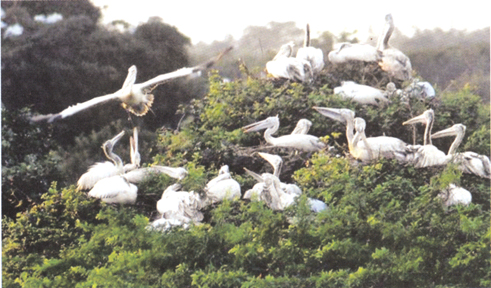
Pelicans nesting at Nelpattu.
Delivering the Pupul Jayakar Lecture hosted by INTACH in Delhi, Prof. Madhav Gadgil said, “A community involves not only human population but other beneficient elements such as hills and rivers, woods and trees, birds and monkeys, and according such beings respect, even veneration.”
“India’s rich heritage of conservation traditions evolved in a society that instinctively respected nature in India. Let us not forget that,” he said.
Prof. Gadgil pointed out that “scientific practices of nature conservation in no way represent a real advance over the traditional folk-knowledge- based systems. All that has happened is that the spatial scale of efforts to conserve biodiversity has changed along with enlargement of resource catchments or footprints of modern societies.” He felt our scientific understanding of complex ecological systems is in fact still very limited. At present there are no universal laws to guide ecological management comparable to the laws of physics and chemistry, for example, that enabled Man to land on the moon.
The professor spoke at length about the destruction to nature and people’s livelihood so widely prevalent in our times. The most glaring example he cited was the Vedanta site in Odisha where forested slopes and flowing streams of the Niyamgiri hills provide a living to the Kondh tribes. The rich biodiversity of the Niyamgiri massif critically links a series of forests and wildlife sanctuaires. Today it is threatened by mining operations. The Vedanta site is one of the main sources of Vamsadhdhara River, and mining operations would result in a hydrological disaster, destroying the very integrity of its ecosystem. It also severely disturbs 7 sq. km of wildlife habitat wrecking its ecology. The Kondhs are agitated because they believe their survival is at stake.
The Government of India Forest Rights Act (FRA) vests recognisable community and habitat rights, with its preamble clearly stating that forest dwellers are “integral to the very survival and sustainability of the forest ecosystem.” The FRA further authorises the Gram Sabhas to ensure that their habitat is preserved from any destructive practices affecting their cultural and natural heritage.
The Forest Rights Act, however, has not been formalised to date, with the result, the District Administrations have often failed to act either fairly or firmly to protect the rights of the Kondhs. In fact, the State Government has already taken a decision to transfer tribal land to the mining group. Dr. Gadgil pointed out: “Not only is the transfer of community resources for mining without seeking their informed consent unfair, it is also illegal after the enactment of the FRA.”
Prof. Gadgil spoke about many other instances of rights being blatantly violated in other States as well. He cited Karwar which was incorporaed into Karnataka in 1960 under the Linguistic Reorganisation of States. Some villagers learned that their land would be taken over and so quickly razed it to the ground in just 2 weeks. The case dragged on for many long years, till eventually the High Court ordered that the land be given back to the villagers.
Concluding his talk by describing many other such instances of FRA violations, Prof. Gadgil posed a devastating question: Should our biodiversity wealth be surrendered to moneyed mining interests, just to serve a capital-intensive economy that is so wasteful of natural resources? The Western world could afford to do it once upon a time as they had successfully accumulated large capital stocks through colonisation. India cannot afford this extravagance. This question needs to be posed in all Indian States. And also needs to be responded by the new Government. (Courtesy: Virasat – the journal of INTACH)
|

